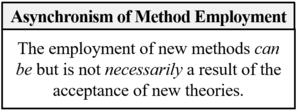Synchronism vs. Asynchronism of Method Employment
Which factors influence the process of method employment? Do new methods become accepted simultaneously with the acceptance of a theory?
This question is important to the scientonomic community because it aims to describe how a new method comes to be employed by a given community. It seeks to answer whether or not method employment necessarily depends upon theory acceptance and whether or not there exist instances in which the employment of a method might not follow the acceptance of a new theory.
In the scientonomic context, this question was first formulated by Hakob Barseghyan in 2015. The question is currently accepted as a legitimate topic for discussion by Scientonomy community.
In Scientonomy, the accepted answer to the question is:
- The employment of new methods can be but is not necessarily a result of the acceptance of new theories.
Contents
Scientonomic History
Acceptance Record
| Community | Accepted From | Acceptance Indicators | Still Accepted | Accepted Until | Rejection Indicators |
|---|---|---|---|---|---|
| Scientonomy | 2 November 2016 | This is when the community accepted its first answer to the question, Asynchronism of Method Employment theorem (Barseghyan-2015), which indicates that the question is itself legitimate. | Yes |
All Theories
| Theory | Formulation | Formulated In |
|---|---|---|
| Asynchronism of Method Employment theorem (Barseghyan-2015) | The employment of new methods can be but is not necessarily a result of the acceptance of new theories. | 2015 |
If a direct answer to this question is missing, please click here to add it.
Accepted Theories
| Community | Theory | Accepted From | Accepted Until |
|---|---|---|---|
| Scientonomy | Asynchronism of Method Employment theorem (Barseghyan-2015) | 1 January 2016 |
Suggested Modifications
Current View
Mirka Loiselle challenged the asynchronism of method employment theorem during the seminar of 2016. According to Mirka, the employment of a method is simultaneous to the acceptance of a proposition stating that the method is effective. Whether or not this poses a challenge to the theorem remains an open question.
In Scientonomy, the accepted answer to the question is Asynchronism of Method Employment theorem (Barseghyan-2015).
Asynchronism of Method Employment theorem (Barseghyan-2015) states: "The employment of new methods can be but is not necessarily a result of the acceptance of new theories."
The theorem states that the employment of a method is not necessarily simultaneous with the acceptance of a new theory. Being a direct logical consequence of the third law, the theorem highlights the fact that some methods are a result of the implementation of some abstract requirements of other methods. In this way, a new method can be devised as a means of resolving a particular creative gap, and subsequently become employed long after the acceptance of the theory that led to the employment of the abstract method.
Related Topics
This question is a subquestion of Mechanism of Method Employment.
References
- a b c Andersen, Hanne and Hepburn, Brian. (2015) Scientific Method. In Zalta (Ed.) (2016). Retrieved from http://plato.stanford.edu/entries/scientific-method/.
- ^ Nickles, Thomas. (2017) Scientific Revolutions. In Zalta (Ed.) (2017). Retrieved from https://plato.stanford.edu/archives/win2017/entries/srevolutions/.
- ^ Barseghyan, Hakob. (2015) The Laws of Scientific Change. Springer.
- ^ Laudan, Larry. (1977) Progress and Its Problems. University of California Press.
- a b c Laudan, Larry. (1984) Science and Values. University of California Press.
